But not priests or bishops in the Orthodox-Catholic Church, the only Church, Christ's one, holy, universal and apostolic Church,
A Christian view of Feminism
| |
Mary Magdalene Apostolorum Apostola – Apostle of the Apostles |
|
| «Come una donna aveva annunciato al primo uomo parole di morte, così una donna per prima annunziò agli apostoli parole di vita» –"Just as a woman had announced the words of death to the first man, so also a woman was the first to announce to the Apostles the words of life" |
| |
Saint Thomas Aquinas, Super Ioannem, ed. Cai §2519 |
| Now on the first day of the week Mary Magdalene came to the tomb early, while it was still dark, and saw that the stone had been taken away from the tomb. So she ran, and went to Simon Peter and the other disciple, the one whom Jesus loved, and said to them, “They have taken the Lord out of the tomb, and we do not know where they have laid him.” Peter then came out with the other disciple, and they went toward the tomb. They both ran, but the other disciple outran Peter and reached the tomb first; and stooping to look in, he saw the linen cloths lying there, but he did not go in. Then Simon Peter came, following him, and went into the tomb; he saw the linen cloths lying, and the napkin, which had been on his head, not lying with the linen cloths but rolled up in a place by itself. Then the other disciple, who reached the tomb first, also went in, and he saw and believed; for as yet they did not know the scripture, that he must rise from the dead. Then the disciples went back to their homes. But Mary stood weeping outside the tomb, and as she wept she stooped to look into the tomb; and she saw two angels in white, sitting where the body of Jesus had lain, one at the head and one at the feet. They said to her, “Woman, why are you weeping?” She said to them, “Because they have taken away my Lord, and I do not know where they have laid him.” Saying this, she turned round and saw Jesus standing, but she did not know that it was Jesus. Jesus said to her, Woman, why are you weeping? Whom do you seek? Supposing him to be the gardener, she said to him, “Sir, if you have carried him away, tell me where you have laid him, and I will take him away.” Jesus said to her, Mary. She turned and said to him in Hebrew, “Rabboni!” (which means Teacher). Jesus said to her, Do not hold me, for I have not yet ascended to the Father; but go to my brethren and say to them, I am ascending to my Father and your Father, to my God and your God. Mary Magdalene went and said to the disciples, “I have seen the Lord”; and she told them that he had said these things to her. |
| |
John 20:1-18 |
|
|
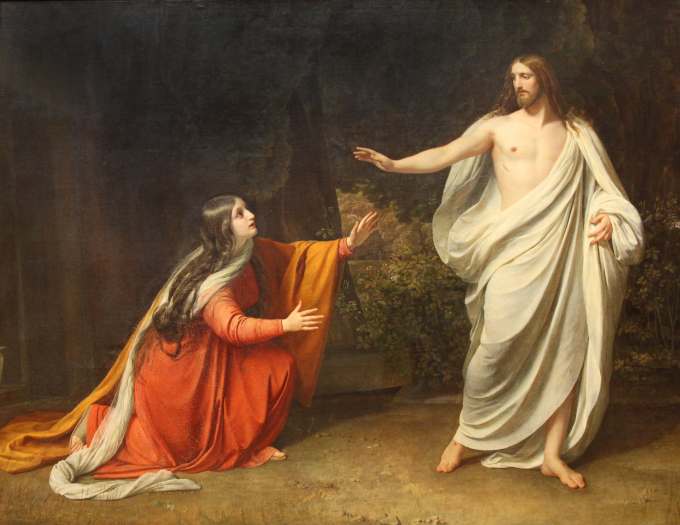 |
| |
|
Явление Христа Марии Магдалине – Appearance of Christ to Mary Magdalene (c. 1835)
Александр Иванов - Alexander Ivanov in Русский Музей – the Russian Museum, St. P. |
|
| |
Saint Lydia – The First Baptized, Christian on the Territory of Europe |
|
As they [Paul, Silas and Timothy] went on their way through the cities, they delivered to them for observance the decisions which had been reached by the apostles and elders who were at Jerusalem [at the Council of Jerusalem, as set forth in Acts 15]. So the churches were strengthened in the faith, and they increased in numbers daily. And they went through the region of Phrygia and Galatia, having been forbidden by the Holy Spirit to speak the word in Asia. And when they had come opposite Mysia, they attempted to go into Bithynia, but the Spirit of Jesus did not allow them; so, passing by Mysia, they went down to Troas [Αλεξάνδρεια Τρωάς – Alexandria Troas, a Hellenistic-Roman city on the Aegean coast in northwest Asia Minor (now Eski Stambul in Turkey)].
And a vision appeared to Paul in the night: a man of Macedonia was standing beseeching him and saying, “Come over to Macedonia and help us.” And when he had seen the vision, immediately we sought to go on into Macedonia [on the Continent of Europe], concluding that God had called us to preach the gospel to them. [Note the use of the pronoun "we," the first such use in the Acts of the Apostles, indicating that Evangelist Saint Luke was now among the Apostolic party which also included at least Silas and Timothy, and which was lead by Apostle Saint Paul.] Setting sail therefore from Troas, we made a direct voyage to Samothrace [Σαμοθρᾴκη – Samothrace, an island forming part of Thrace, an administrative region of northeast Greece], and the following day to Neapolis [not to be confused with Νεάπολη – Neapoli, in modern times a suburb of Thessaloniki, this ancient Greek and Biblical Νεάπολις – Neapolis is now the Greek seaport of Καβάλα – Kavala, on mainland Greece], and from there to Philippi, which is the leading city of the district of Macedonia, and a Roman colony.
We remained in this city some days; and on the sabbath day we went outside the gate to the riverside [there being no synagogue in Philippi], where we supposed there was a place of prayer; and we sat down and spoke to the women who had come together. One who heard us was a woman named Lydia, from the city of Thyatira, a seller of purple goods [purple die was an extremely expensive commodity], who was a worshiper of God. The Lord opened her heart to give heed to what was said by Paul. And when she was baptized, with her household, she besought us, saying, “If you have judged me to be faithful to the Lord, come to my house and stay.” And she prevailed upon us.
[Here Lydia is called a "worshiper of God." This is a key term and idea in understanding the development of the early Church. In numerous places in the Acts of the Apostles one meets these God-fearers – φοβούμενος or θεοσέβής–God-worshipers, as, for example, with the centurion, Cornelius, at Caesarea in Acts 10:1, and also in Acts 13:16 (“Men of Israel, and you that fear God"); Acts 13:26 (“Brethren, sons of the family of Abraham, and those among you that fear God, to us has been sent the message of this salvation."). With precedents in the proselytes–προσήλυτος of the Old Testament, these people were monotheistic. Often Greeks, they attached themselves in various ways and to varying degrees to Hellenistic Judaism, without becoming full converts, especially in the sense of the men having undergone that key Judaic rite of admission, circumcision. In the just cited verses from Acts 13, Paul is addressing these very God-fearing Greeks in the synagogue in Pisidian Antioch – Ἀντιόχεια τῆς Πισιδίας on the sabbath! The God-fearers, like Cornelius and Lydia, played a central role in the development of the early Church.] |
| |
Acts 16:4-15 [notes and emphasis added] |
|
|
|
|
| |
|
|
|
| [W]omen should adorn themselves modestly and sensibly in seemly apparel, not with braided hair or gold or pearls or costly attire but by good deeds, as befits women who profess religion. Let a woman learn in silence with all submissiveness. I permit no woman to teach or to have authority over men; she is to keep silent. For Adam was formed first, then Eve; and Adam was not deceived, but the woman was deceived and became a transgressor. Yet woman will be saved through bearing children, if she continues in faith and love and holiness, with modesty. |
| |
First Epistle of Apostle Saint Paul to Saint Timothy 2:9-15 |
| Influence is more important than authority, because authority is limited to actions ... Influence is your whole being. |
| |
Alice von Hildebrand |
| |
And women disciples of Jesus — unlike eleven of the Twelve (all except Apostle Saint John, one of the Twelve and of the Three) — did not abandon Jesus in the hour of his Passion. |
|
| |
|
(Matthew 27:55-56,61 and Mark 15:40-41) |
|
| Now after the sabbath, toward the dawn of the first day of the week, Mary Magdalene and the other Mary went to see the sepulchre. And behold, there was a great earthquake; for an angel of the Lord descended from heaven and came and rolled back the stone, and sat upon it. His appearance was like lightning, and his raiment white as snow. And for fear of him the guards trembled and became like dead men. But the angel said to the women, "Do not be afraid; for I know that you seek Jesus who was crucified. He is not here; for he has risen, as he said. Come, see the place where he lay. Then go quickly and tell his disciples that he has risen from the dead, and behold, he is going before you to Galilee; there you will see him. Lo, I have told you." So they departed quickly from the tomb with fear and great joy, and ran to tell his disciples. And behold, Jesus met them and said, "Hail!" And they came up and took hold of his feet and worshiped him. Then Jesus said to them, "Do not be afraid; go and tell my brethren to go to Galilee, and there they will see me." |
| |
Matthew 28:1-10 |
| |
| Now when he rose early on the first day of the week, he appeared first to Mary Magdalene, from whom he had cast out seven demons. She went and told those who had been with him, as they mourned and wept. But when they heard that he was alive and had been seen by her, they would not believe it. |
| |
Mark 16:9-11 |
| |
| The women who had come with him from Galilee followed, and saw the tomb, and how his body was laid; then they returned, and prepared spices and ointments. On the sabbath they rested according to the commandment. But on the first day of the week, at early dawn, they went to the tomb, taking the spices which they had prepared. And they found the stone rolled away from the tomb, but when they went in they did not find the body. While they were perplexed about this, behold, two men stood by them in dazzling apparel; and as they were frightened and bowed their faces to the ground, the men said to them, "Why do you seek the living among the dead? Remember how he told you, while he was still in Galilee, that the Son of man must be delivered into the hands of sinful men, and be crucified, and on the third day rise." And they remembered his words, and returning from the tomb they told all this to the eleven and to all the rest. Now it was Mary Magdalene and Jo-an'na and Mary the mother of James and the other women with them who told this to the apostles; but these words seemed to them an idle tale, and they did not believe them. |
| |
Luke 23:55-56 through 24:1-11 |
| The Cappadocian Connection |
|
|
| |
Γρηγόριος Νεοκαισαρείας ή Γρηγόριος ο Θαυματουργός |
|
| |
Sanctus Gregorius Neocaesariensis sive Thaumaturgus |
|
| |
Святой Григорий Чудотворец |
|
| |
Saint Gregory of Neocaesarea or Gregory Thaumaturgus, that is, the Miracle-Worker |
|
| |
|
|
| |
(* c. 213 Neocaesarea, Pontus, Anatolia – Pontus 270 †) |
|
| |
|
|
| |
First Bishop of Neocæsarea in Pontus in northern Anatolia and an extraordinary saint, who won for Christ most of the people in his episcopal see of Neocaesarea. |
|
| |
Αγία Μακρίνα η Πρεσβυτέρα |
|
|
|
| |
Sancta Macrinam major natu |
|
|
|
| |
Святая Макрина Старшая |
|
|
|
| |
Saint Macrina the Elder |
|
|
|
| |
|
|
|
|
| |
(* before 270 Caesarea, Cappadocia – Caesarea, Cappadocia 340 †) |
|
|
|
| |
|
|
|
|
| |
Saint Macrina the Elder, matriarch and teacher of that most extraordinary family of that most extraordinary time in the history of the Church, was influenced in her childhood by the teachings of the first bishop of her town, Saint Gregory the Wonderworker. Later, she and her husband (name not unknown to us) fled the persecutions of Diocletian. Saint Macrina is a heroic confessor of the Faith, the mother of Saint Basil the Elder and the grandmother of his and Saint Emily's children, including five saints that we know of, over whom she exercised much spiritual influence. Two of these sainted grandchildren, Saint Basil the Great and his younger brother Saint Gregory of Nyssa are (together with Saint Gregory of Nazianzus) known collectively to many centuries of the Orthodox-Catholic Church as the Cappadocian Fathers. Saint Basil the Great also is known as one of the Three Great Hierarchs of the Universal Church, the other two being Saint John Chrysostom and Saint Gregory of Nazianzus. |
|
Saint John Chrysostom, the Golden Mouth – Άγιος Ιωάννης ο Χρυσόστομος – Святой Иоанн Златоуст (* c. 349 Antioch – Comana in Pontus 14 September 407 †)
Saint Gregory of Nazianzus, known also, especially within the Slavic Churchs as Gregory the Theologian – Άγιος Γρηγόριος ὁ Ναζιανζηνός – Святой Григорий Богослов (* c. 329 – 25 January 390 †) |
|
| |
|
Ἅγιος Βασίλειος ο Πρεσβύτερος |
|
|
|
Αγία Εμίλια Καισάρεια |
|
|
| |
|
Sanctus Basilius major natu |
|
|
|
Sancta Emilia Caesarea |
|
|
| |
|
Святой Василий Старший |
|
|
|
Святая Емилия Кесарийская |
|
|
| |
|
Saint Basil the Elder |
|
|
|
Saint Emily (or Emmelia or Emilia) of Caesaria |
|
|
| |
|
|
|
|
|
|
|
|
| |
|
|
|
|
|
(* Caesarea, Cappadocia, Anatolia – (8 May) 375 †) |
|
|
| |
|
|
|
|
|
|
|
|
| |
|
Husband and wife, both saints, were persecuted and banished for their faith during the reign of the Emperor Galerius Maximian |
|
|
| |
|
|
|
|
|
|
|
|
| |
|
|
|
|
|
mother of nine or ten children, including these five saints: |
|
|
| Αγία Μακρίνα η Νεότερος |
|
Ἅγιος Βασίλειος ὁ Μέγας |
|
Άγιος Γρηγόριος Νύσσης |
|
Ἅγιος Πέτρος της Σεβάστειας |
|
Αγία Θεοσέβεια Διακονιασ |
| Sancta Macrinam |
|
Sanctus Basilius Magnus |
|
Sanctus Gregorius Nyssenus |
|
Sanctus Petri Sebastensis |
|
Sancta Theosebia diaconisa |
| Святая Макрина Младшая |
|
Святой Василий Великий |
|
Святой Григорий Нисский |
|
Святой Пётр Севастийских |
|
Святая Теосебия диаконисс |
| Saint Macrina the Younger |
|
Saint Basil the Great |
|
Saint Gregory of Nyssa |
|
Saint Peter of Sebaste |
|
Saint Theosebia the Deaconess |
| |
|
|
|
|
|
|
|
|
The Great Cappadocian Mother
Through her influence on her brothers, Saint Macrina influenced the Second Ecumenical Council and with this the very
Niceno-Constantinopolitan Creed
Saint Gregory of Nyssa, one of Macrina's younger brothers and one of the Council Fathers, records that, at her death bed he (Gregory) |
|
|
|
Bishop of Nyssa from 372 to 376; briefly deposed but again bishop from 378 until his death in circa 395, and also having assumed many of the responsibilities in Pontus of his saintly brother after Basil's repose in 379. Saint Gregory of Nyssa was a Father of the Second Ecumenical Council, the First Council of Constantinople. Saint Gregory of Nyssa was influenced by Origen – Ὠριγένης – Ориген (c. 184 Alexandria, Egypt – Tyre (ancient Phoenicia, now Lebanon) c. 254), an enormously prolific and influencial early theologian, but not a canonized saint. Some of Origen's writings are not orthodox. It has been posited by some and disputed by others that some of Saint Gregory of Nyssa's writings embrace universal salvation of all human beings. (See 1 Corinthians 15:28 and Philippians 2:10) |
|
Bishop of Sebaste in Lesser Armenia (in Anatolia, south of Pontus) and a Father of the Second Ecumenical Council, Saint Peter had been greatly influenced by his elder sister, Saint Macrina the Younger |
|
(Note, the office of deaconess was not ordained ministry. It was holy, and this deaconess is elevated to the honor of the altar.) |
| |
|
|
|
|
|
|
|
|
(* c. 324 Caesarea, Cappadocia –
Amasya, Pontus, Anatolia 380 †) |
|
(* c. 330 Caesarea, Cappadocia –
Caesarea, Cappadocia 1/2 January 379 †) |
|
(* c. 335 Caesarea, Cappadocia –
Nyssa, Cappadocia c. 395 †) |
|
(* c. 340 Caesarea, Cappadocia –
Sebaste 26 March 391 †) |
|
(* Caesarea, Cappadocia – 385 †) |
| |
This vital topic is not dealt with in the film - United European Christendom - Heal the Schism Now.
The reader will already have noticed that there are many topics related to how to restore and build a Christian civilization which are touched upon in this website but which are not part of the film.
The topic of Christian feminism, the leading and vital role of women within the Church, a role by no means inferior to that undertaken by men, and how there is no conflict between this role and the fact that God Himself called an all-male priesthood and episcopacy — a question which is eternally settled and never subject to revision by wo/mankind — will perhaps be addressed in a subsequent film by the present writer. Within the context of European Christendom, one central strand of any such effort will surely have to involve the tracking of the role which Christian grandmothers, mothers and wives undertook in bringing their grandsons, sons and husbands to Christ and His Church. More specifically, at a time when the conversion of a people was held to have occurred when their ruling prince or king or emperor embraced The Faith and received baptism — the actual conversion of the people being a process having followed over the ensuing decades and centuries — it was so very often the case, so strikingly often the case that it was first the royal woman who was drawn to Christ, to be followed in part on the back of her lead by her grandson, son or husband ruler.
For now perhaps the following examples will whet the curiosity of the recently initiated and encourage focused study by specialists: |
|
|
|
|
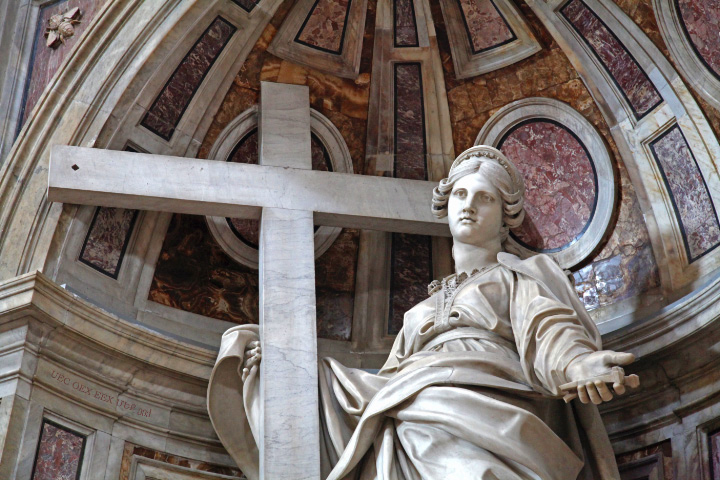
... statute in Saint Peter's Basilica, Vatican
Saint Helena, discoverer of the True Cross (*c. 246/50 – 18 August 330†) first a Christian ...
then later her son Emperor Saint Constantine the Great - Flavius Valerius Aurelius Constantinus Augustus
(*27 February 272 – 22 May 337†) became a Christian gradually and was baptized shortly before his death. |
|
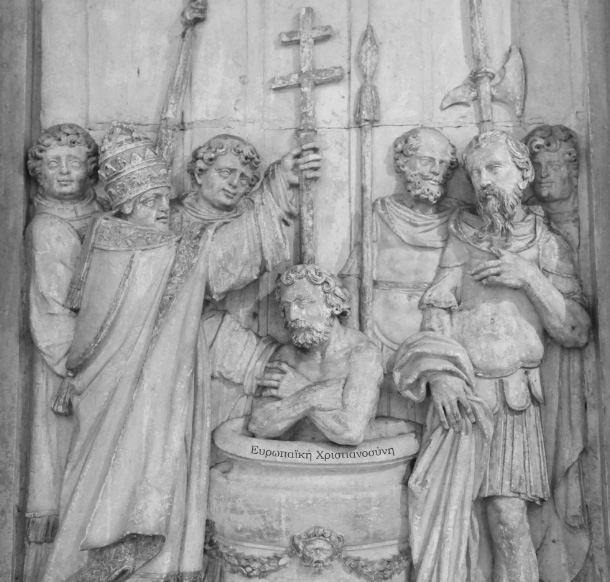
... medieval base relief in the Basilica of Saint Remi in Reims, France
depicting the Baptism of Emperor Constantine the Great. |
| |
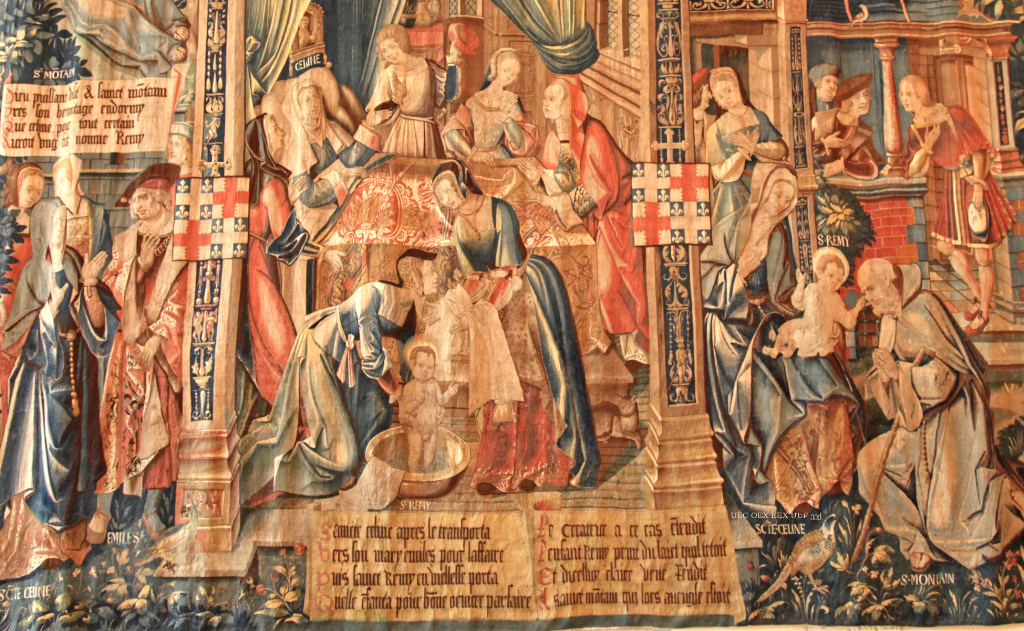 |
|
| |
... from tapestries in Reims, Saint Celine, the mother of Saint Remi, the baptizer of Clovis, tribal chieftain of the Gauls, then Christian King of France, but before Clovis, his queen, Clotilde. |
|
| |
But as for you, teach what befits sound doctrine. Bid the older men be temperate, serious, sensible, sound in faith, in love, and in steadfastness. Bid the older women likewise to be reverent in behavior, not to be slanderers or slaves to drink; they are to teach what is good, and so train the young women to love their husbands and children, to be sensible, chaste, domestic, kind, and submissive to their husbands, that the word of God may not be discredited. |
|
| |
|
Titus 2:1-5 |
|
| A Marriage – Rebecca and Isaac |
| |
|
Then I bowed my head and worshiped the Lord, and blessed the Lord, the God of my master Abraham, who had led me by the right way to take the daughter of my master’s kinsman for his son [Isaac]. Now then, if you will deal loyally and truly with my master, tell me; and if not, tell me; that I may turn to the right hand or to the left.”
Then Laban [Rebecca's brother] and Bethuel [Rebecca's father] answered, “The thing comes from the Lord; we cannot speak to you bad or good. Behold, Rebekah [Rebecca] is before you, take her and go, and let her be the wife of your master’s son [Isaac], as the Lord has spoken.” |
| |
Genesis 24: 48-51 |
|
|
|
|
| |
|
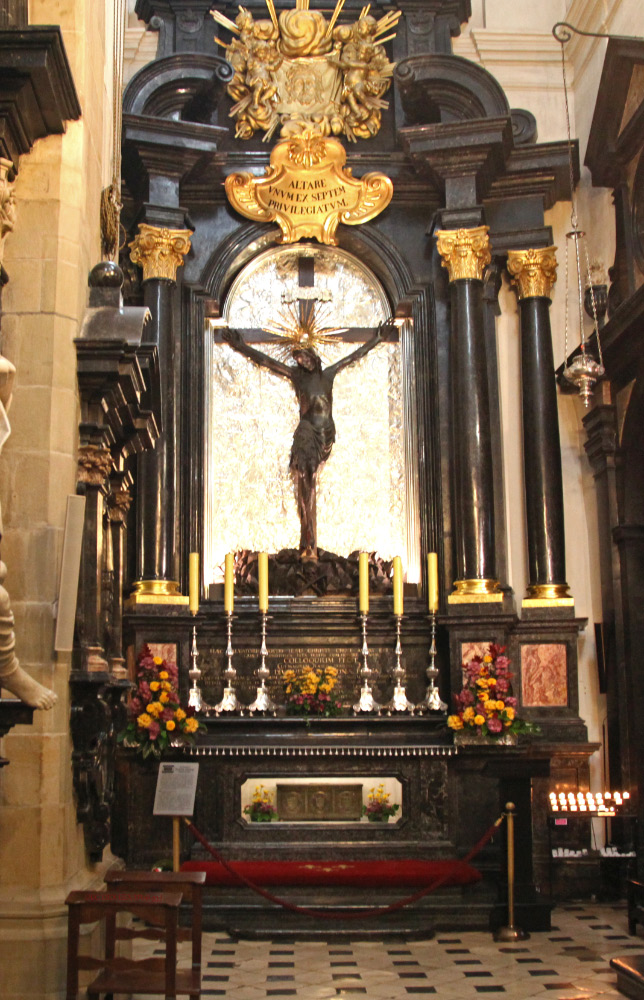 |
| |
|
... altar in Wawel Cathedral with relics of Queen Saint Jadwiga (*1373/4 – 17 July 1399†) |
|
|
|
|
|
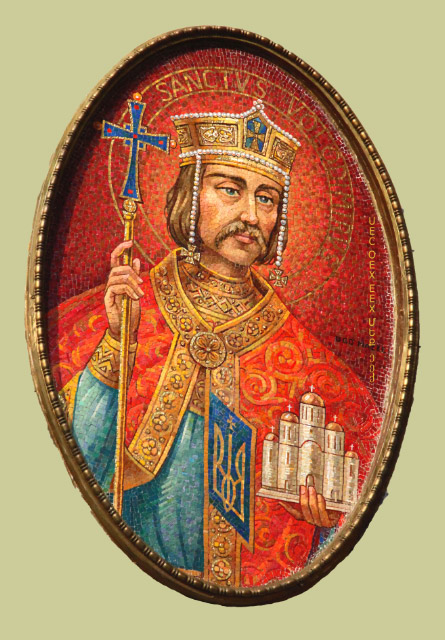 |
|
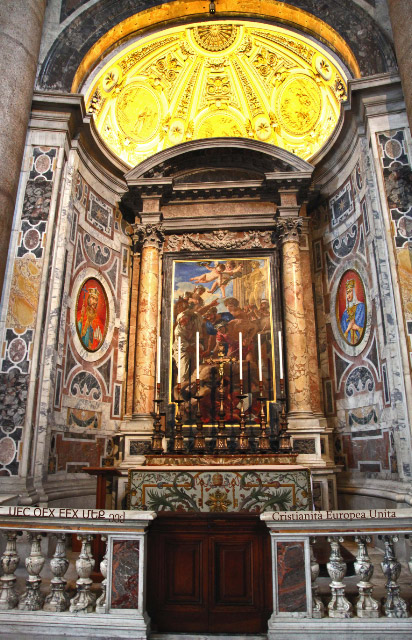
Altar in right-north transept of Basilica di San Pietro in Vaticano |
|
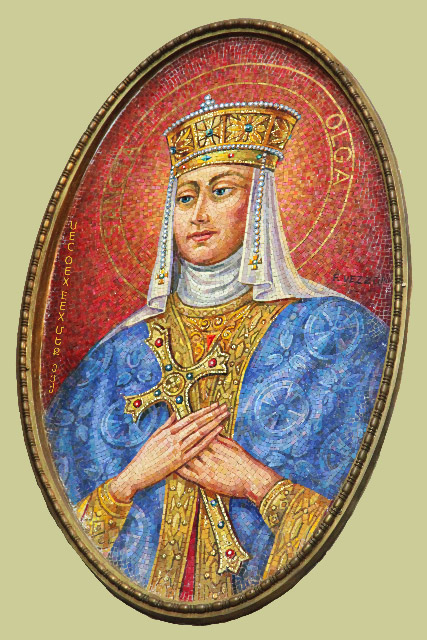 |
| Володимѣръ Свѧтославичь |
| |
— Valdamarr Sveinaldsson |
|
|
|
|
Ольга — Helga |
| |
|
|
Святого Рівноапостольного Великого Київського Князя Володимира Святославича, Просвітителя Русі в 988
Святого Равноапостольного Великого Киевского Князя Владимира Святославича, Просветителя Руси в 988
Святога Роўнаапостальнага Вялікага Кіеўскага Князя Уладзіміра Святаславіча, Асветніка Русі ў 988
Grand Prince of Kiev, Saint Vladimir Sviatoslavich, Equal of the Apostles, Illuminator of Rus in 988
(*958/60; r. 11 June 980 – 15 July 1015†) |
|
Святої Рівноапостольної Київської Княгині Ольги
Святой Равноапостольной Киевской Княгини Ольги
Святой Роўнаапостальнай Кіеўскай Княгіні Вольгі
Regent Saint Olga, Equal of the Apostles, (* c. 890; reigned from 945 to 963 as regent of Kievan Rus' for her son, Saint Vladimir's father, Grand Prince of Kiev Svyatoslav; Grand Princess Saint Olga reposed on 11 July 969†)
Baptized in 957 in Constantinople. |
|
|
|
| |
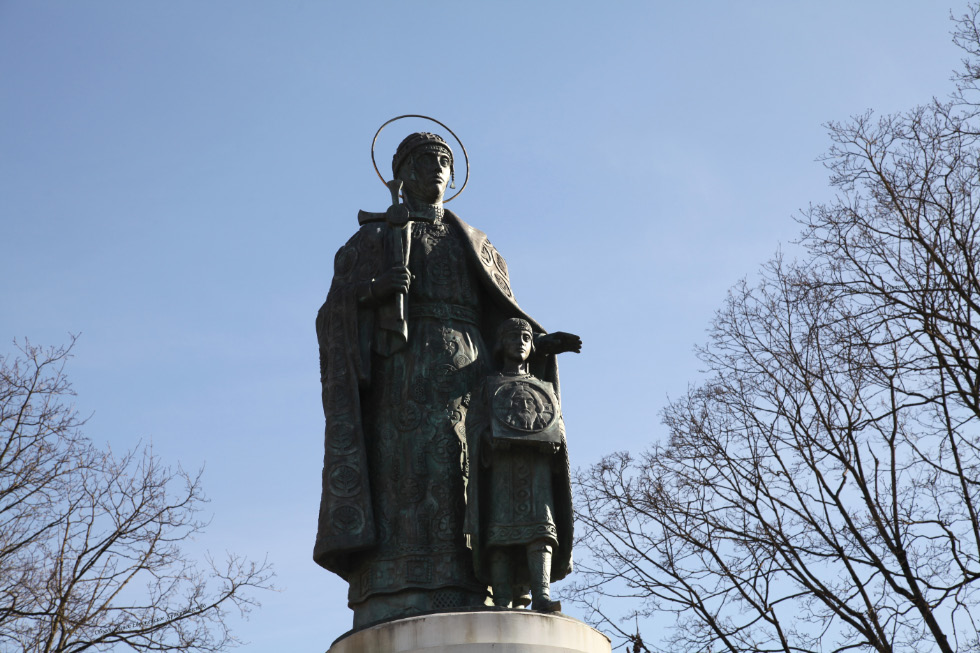 |
|
| |
Monumental bronze sculpture of grandmother and grandson in Olga's home town of Pskov by В М Клыков – V.M. Klykov. |
|
|
|
|
| |
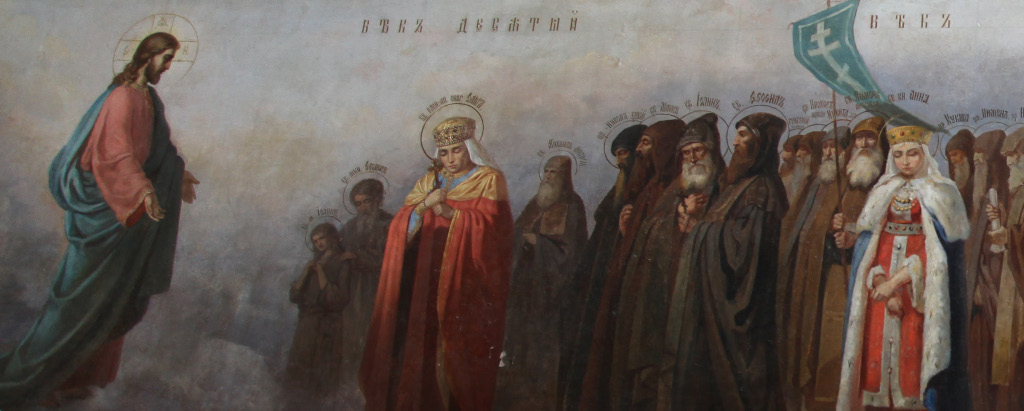 |
|
| |
Saint Olga of Pskov and of Kyiv honored before other saints, pictured highlighted and standing closer to Christ in the Спасо-Преображенский Собор – Transfiguration of the Saviour Cathedral of Valaam Monastery |
|
| |
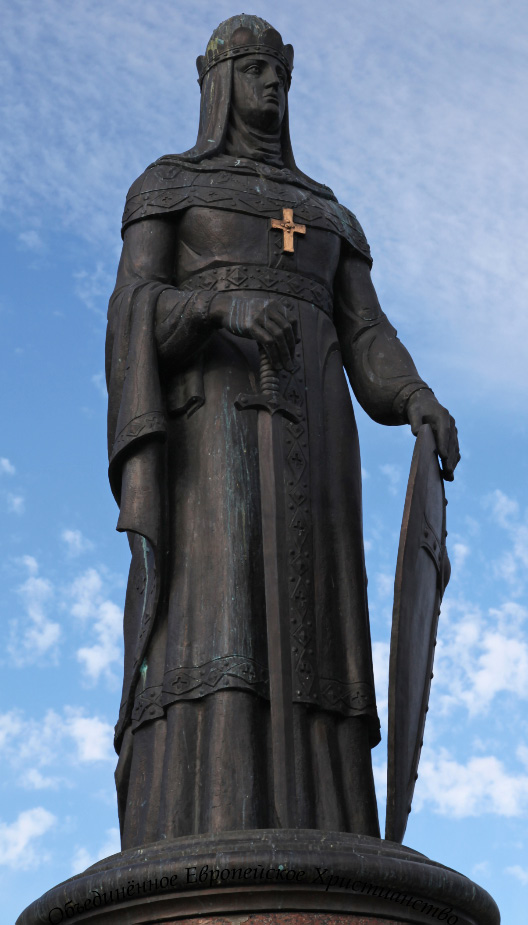 |
|
| |
three crosses |
|
| |
Monument in Pskov of Princess Saint Olga by ზურაბ კონსტანტინეს ძე წერეთელი – Zurab Konstantines dze Tsereteli – Зураб Константинович Церетели (* 1934) |
|
| Rise, and have no fear. |
|
This is my beloved Son, with whom I am well pleased; listen to him. |
the Holy Spirit |
Man proposes, God disposes |
| Alternatives to the Christian view: |
|
Men are in charge of women, because Allah hath made the one of them to excel the other, and because they spend of their property (for the support of women). So good women are the obedient, guarding in secret that which Allah hath guarded. As for those from whom ye fear rebellion, admonish them and banish them to beds apart, and scourge them. Then if they obey you, seek not a way against them. Lo! Allah is ever High, Exalted, Great. |
| |
|
Qur'an 4:34 |
|
|